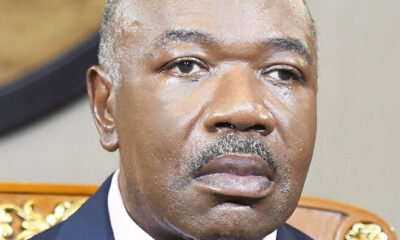Africa
Former Sierra Leone President relocates to Nigeria on asylum after treason charges
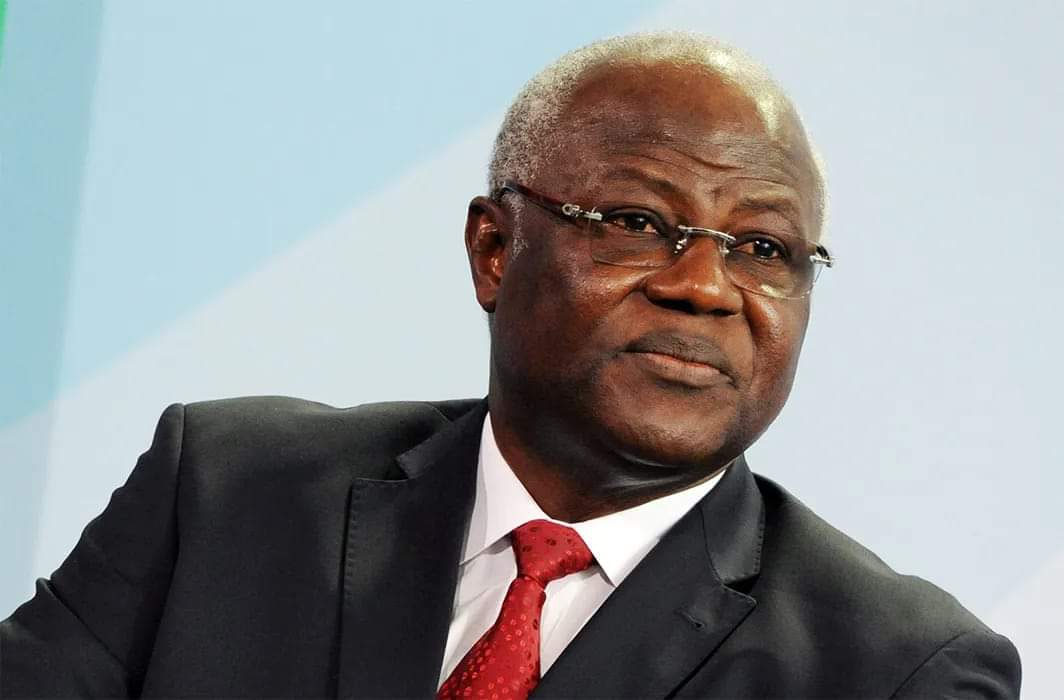
Former Sierra Leone President relocates to Nigeria on asylum after treason charges
The Economic Community of West African States (ECOWAS) announced plans to relocate former Sierra Leonean President Ernest Bai Koroma to Nigeria on Thursday, sparking controversy.
The ECOWAS Commission President, Omar Alieu Touray, said in a statement on Wednesday that the decision to transfer Koroma was based on an agreement made by an ECOWAS Mission to Freetown on December 23.
President Nana Addo Dankwa Akufo-Addo of Ghana and Senegal’s Macky Sail led the high-level delegation.
Touray added that the former President has accepted the invitation to be entertained in Nigeria, and that arrangements will be made to fly him out of Freetown today, subject to approval.
The former Sierra Leonean President was on Tuesday charged with four counts of treason in connection to an attempted coup.
However, Sierra Leone Foreign Minster Timothy Kabba told the British Broadcasting Corporation (BBC) the government did not support the proposal to relocate Koroma, which he described as a unilateral proposition by the ECOWAS Commission President.
But, Touray’s statement on Koroma’s relocation to Nigeria, titled: “Temporary relocation of former President to Abuja”, reads: “I am pleased to inform Your Excellency that as part of the agreement reached during the mission, the government of the Federal Republic of Nigeria has offered to host His Excellency Ernest Bal Koroma, former President of Sierra Leone, in Abuja on a temporary basis.
READ ALSO:
- FG orders agencies to immediately begin 50% remittance of IGR
- Africa’s richest: S’African businessman Rupert displaces Dangote
- No plans to increase fuel price to N1,200/litre – NNPC
“The former President has accepted the offer to be hosted In Nigeria. Subject to your approval, arrangements will be made to fly former President Koroma out of Freetown on Thursday, 4th January.”
However, the former president’s lawyer, Joseph Kamara, told the BBC he was “shocked and in utter disbelief”, saying the charges set a “dangerous precedent.
“A dark cloud has shadowed the skies of our country. Meaning that we are dragging a former head of state – democratically elected – on trumped-up charges under a political vendetta,” he said.
Last November, gunmen broke into a military armoury and several prisons in Freetown, freeing almost 2,000 inmates.
He has denied any involvement in the attack, which killed about 20 people.
On Tuesday, Koroma and 11 other people were charged over the attempted coup, including one of Mr. Koroma’s former bodyguards.
Koroma has been under house arrest since being questioned over the coup.
He was President for 11 years until 2018, when incumbent President, Julius Maada Bio, was elected.
The former president’s daughter, Dankay Koroma, has previously been named on a list of wanted suspects by the police. She has not commented.
The attempted coup came five months after a disputed election which President Bio narrowly won to continue in office.
The results were rejected by Koroma’s All People’s Congress. International observers also criticised the elections, highlighting a lack of transparency in the count.
Former Sierra Leone President relocates to Nigeria on asylum after treason charges
Africa
Ghana President Akufo-Addo’s address disrupted as ADC collapses (Video)
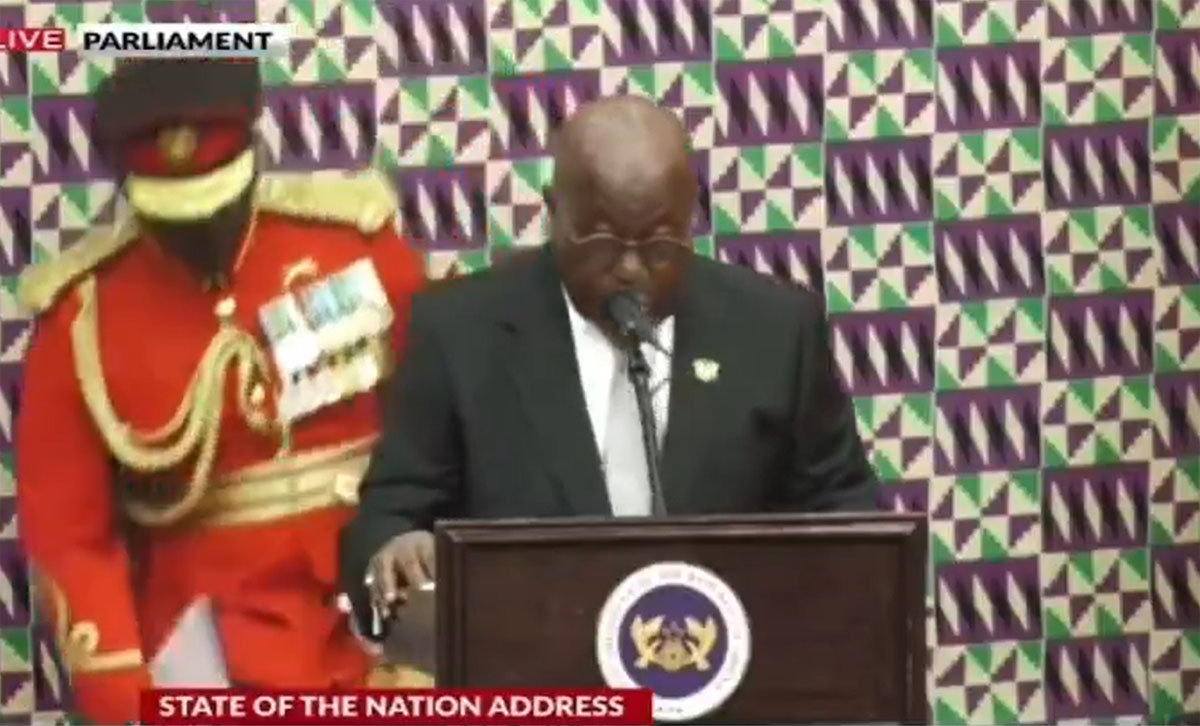
Ghana President Akufo-Addo’s address disrupted as ADC collapses (Video)
President Nana Addo Dankwa Akufo-Addo’s last State of the Nation address in Parliament on Friday was interrupted when his aide-de-camp (ADC) collapsed.
In a viral video, the ADC, identified by Ghana Web as Colonel Isaac Amponsah, fell midway into Mr Akufo-Addo’s address before the Ghana parliament
Before he collapsed, Mr Amposah showed discomfort but could not help himself from falling to the ground.
READ ALSO:
The incident briefly interrupted the President’s address but he resumed his presentation after a few minutes, after the ADC was carried to a corner of the auditorium for medical attention.
The aide-de-camp of the Vice President, a police officer immediately took over to stand behind the president.
As at the thime of this report, the cause of Amponsah’s collapsed is yet to be ascertained.
The President's bodyguard collapses in parliament as Akufo-Addo reads the State of the Nation address.#TV3GH #SONA pic.twitter.com/0ZhDYuhr6T
— #TV3GH (@tv3_ghana) January 3, 2025
Ghana President Akufo-Addo’s address disrupted as ADC collapses (Video)
Africa
Panic as huge space object crashes into Kenyan village
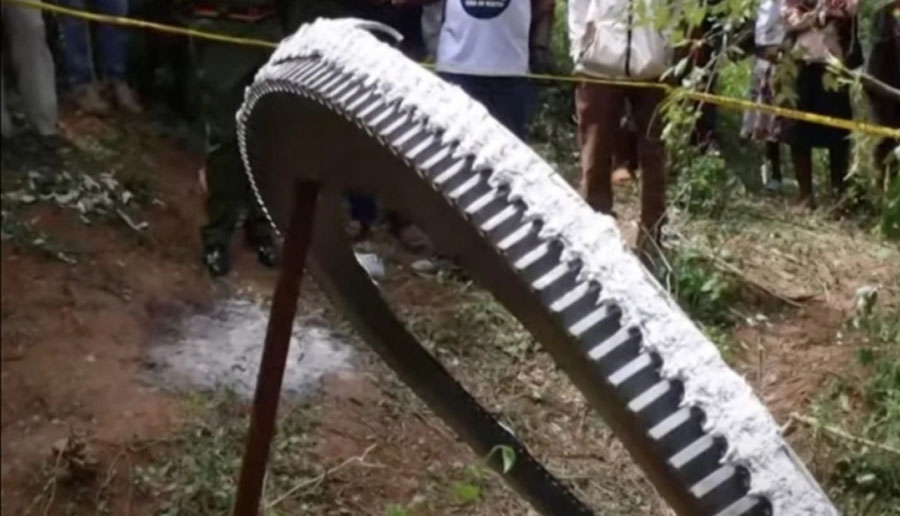
Panic as huge space object crashes into Kenyan village
A massive, fiery object fell from the sky into a remote village in Kenya on Monday afternoon, causing alarm among locals and prompting an immediate investigation by the Kenya Space Agency (KSA).
The KSA confirmed in a statement on Wednesday that the object was a fragment of a space object. The debris, described as a metallic ring, landed in the village of Mukuku in Makueni County. Measuring approximately 2.5 meters (about 8 feet) in diameter and weighing 500 kilograms (about 1,100 pounds), the object has been taken into custody by the agency.
“The Agency wishes to clarify that the object, a metallic ring measuring approximately 2.5 meters in diameter and weighing about 500 kg, is a fragment of a space object,” the KSA stated.
READ ALSO:
- Kidnappers demand additional N60m to release couple after family raise N10m ransom
- Drunk police officer ‘frees’ 13 suspects to celebrate new year
- Fubara ignores pro-Wike lawmakers, signs N1.18tn 2025 appropriation
Preliminary analysis suggests the object could be a separation ring from a rocket, according to the agency. It noted that such space debris typically burns up in the atmosphere or falls into the ocean.
This incident highlights the increasing congestion of Earth’s orbit, with satellites and other objects creating challenges for managing space debris.
Julius Rotich, Mbooni Sub County Police Commander, told the Kenya Broadcasting Corporation that the object was still hot when officers arrived. Residents were kept at a safe distance until the debris cooled.
The broadcaster aired footage of the object, showing it entangled in trees and surrounded by police tape, as curious villagers looked on.
The KSA is continuing its investigation to determine the origin of the debris. While the agency suggests this is an isolated incident, it underscores the growing risks associated with falling space objects.
Panic as huge space object crashes into Kenyan village
CNN
Africa
Niger’s president faces fire at home over attack on Nigeria

Niger’s president faces fire at home over attack on Nigeria
Niger’s President Abdourahmane Tchiani is facing a backlash of criticism from his fellow countrymen following his recent allegation of a conspiracy by Nigeria against his country.
Tchiani in a Christmas Day interview claimed, among other things, that Nigeria had provided a base for French soldiers near Lake Chad had established training camps for terrorists in Sokoto, Zamfara and Kebbi states, all aimed at destabilising Niger.
The Federal Government has dismissed the allegations as baseless, with National Security Adviser Nuhu Ribadu and Special Adviser to the President on Policy Communication, Daniel Bwala, being the latest government official to debunk the claims.
Many Nigerien citizens reacting on social media to Tchiani’s claims against Nigeria say there is no credibility whatsoever in the allegations.
Some of them are of the view that the Nigerien leader was only looking for an excuse to hang his failure in office on after 17months of ousting his predecessor, Mohamed Bazoum, in a palace coup.
One Nigerien critic even alleged that loyalists of the Niamey military regime are under instruction to spread falsehood that France in collaboration with Nigeria and other neighbouring countries plans to invade Niger.
A Nigerien commentator, Maidalili Namu, spoke of alleged frustration of the Tchiani regime to stabilise the country as they promised to do after deposing Bazoum.
Namu claimed on Muduba Mugani podcast that the country is being ruined by those he branded 16 generals.
“You have been in power for 17 months, confined to the villa and fed with false information that clouds your judgment,” PR Nigeria quoted Namu as saying of Tchiani in a video recording.
READ ALSO:
- Israel attacks: UN warns humanitarian disaster in Yemen may get worse
- Wike: My fallout with Secondus was his opposition to Fubara
- Bashar Assad relatives while trying to fly out of Lebanon
Namu also accused the Nigerien strongman of fostering animosity both regionally and internationally, sowing seeds of discord with Niger’s neighbors and other nations.
He said: “When it was announced that you would address the nation at 8 pm on December 25, 2024, in Hausa, Zabarma and French, the prevailing rumour was that your speech would lack originality, filled only with the usual condemnation of France, ECOWAS, Nigeria and others as our adversaries.
“Some even wagered that they would give goats or cash if you didn’t mention France in your address.
“Nigeriens are fed up with your repetitive statements that yield no progress.
“What is most frustrating is that you vindicated their predictions. Some even began to tally how many times you mentioned France, Nigeria and ECOWAS, suggesting they are conspiring to destabilise Niger.
“You have accused numerous countries, both within and outside Africa, of undermining Niger, leading some to question your mental fitness for leadership.
“Your diplomatic failures are evident. You have insulted numerous leaders from various countries, implicating at least 20 nations in a conspiracy against Niger, many of whom we have no direct relations with.
“The real issues affecting Nigeriens—economic hardship, insecurity, unemployment, fuel scarcity and the rising cost of living—were overlooked.
“Instead, we heard the same old narrative of external threats and unfounded claims of terrorist camps supervised by the French.
“You asserted that camps have been established for training terrorists in Burkina Faso and Niger—concluding that by the end of 2024, at least 400 terrorists will be trained under French supervision.
“If you possess accurate information about these camps, why do you not coordinate efforts to dismantle them instead of using this information merely as a talking point?
“You must recognise that none of the leaders you’ve insulted have retaliated; you have disparaged leaders from countries like Tanzania, Mauritania, Chad and others. If your assertions hold any truth, how can we possibly survive more than 24 hours amidst the threats you mention?
Niger’s president faces fire at home over attack on Nigeria
THE NATION
-

 metro1 day ago
metro1 day ago‘Deepen Shariah knowledge to curb misinformation’
-
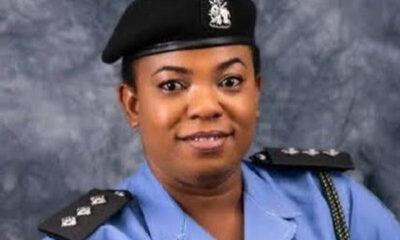
 metro1 day ago
metro1 day agoIlorin: Retired works controller murdered on New Year’s Day
-

 metro1 day ago
metro1 day agoJealous husband stabs Bishop to death over allege affair with wife
-

 metro1 day ago
metro1 day agoTinubu’s refusal to honour Seyi’s pact with us disappointing – Nnamdi Kanu’s family
-

 Politics3 days ago
Politics3 days agoHow Tinubu outsmarted Buhari to become president – Ojudu
-
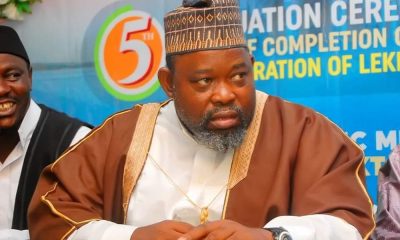
 metro17 hours ago
metro17 hours agoMosques should be research centres – Varsity don
-

 metro3 days ago
metro3 days agoHorror in Ogun as twin brothers kill, dismember sex worker
-
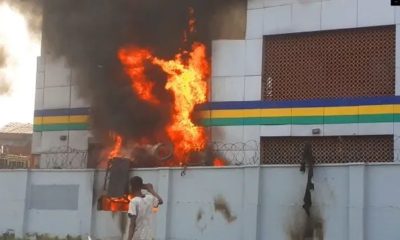
 metro3 days ago
metro3 days agoFire razes police station, buildings in Lagos









